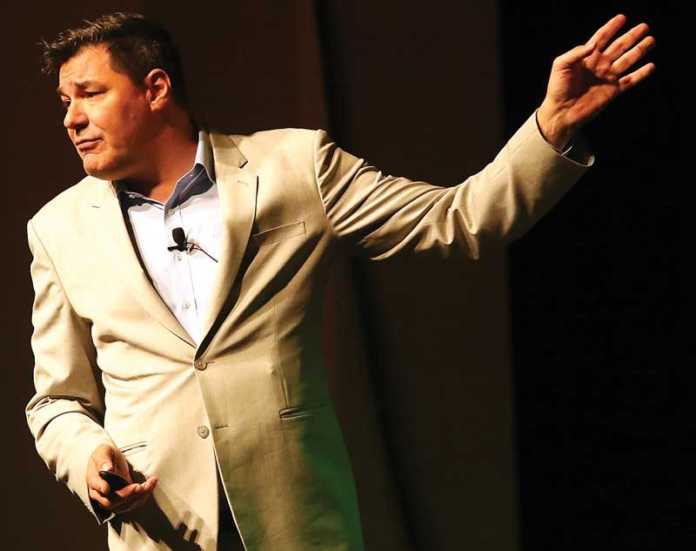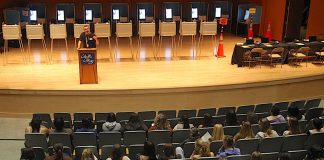(Chris Thornberg, founding partner of Beacon Economics, was the keynote speaker Thursday at the fourth-annual Regional Economic Summit sponsored by the Monterey Bay Economic Partnership at the Mello Center in Watsonville. Photo by Tarmo Hannula/Pajaronian)
WATSONVILLE — Hundreds of people from throughout the Monterey Bay region came to the Henry J. Mello Center Thursday to hear financial experts give a brief synopsis of the nation’s financial health, as well as that of the region.
The fourth-annual Regional Economic Summit brought business professionals, governmental officials and others under one roof to get a snapshot of local, state and federal economic trends.
It was also a chance for attendees to network with people whose professional and social circles might not otherwise intersect, said Pajaro Valley Chamber of Commerce and Agriculture CEO Shaz Roth.
“I never miss one of these,” she said.
The Thursday event might be considered a sampler platter of the economic smorgasbord that is the State of the Region forum in Seaside on Nov. 30.
Keynote speaker Chris Thornberg, described in event literature as one of the nation’s leading economists, said that the U.S. is overall in good financial health, and pointed to a recent surge in global trade.
He also said that the Gross Domestic Product is up by 3 percent, and that the country is seeing the second-largest bout of post-recession financial growth in U.S. history.
Global economy, meanwhile, has seen a 3.9 percent growth.
“It was a great year for growth,” he said.
Still, Thornberg cautioned that such growth is not a good predictor for future economic crashes.
“Predicting the next recession is predicting what the next shock is going to be,” he said.
Thornberg said that the nation currently has a 4 percent unemployment rate, and that job growth is slowing as employers look for workers.
This is due in part to an aging workforce, and to attacks on undocumented immigrants, who he said fill a vital role in the country.
“They are part of the solution, not part of the problem,” he said.
Describing himself as a “radical centrist,” Thornberg avoided partisan politics, saying such ideology is what is preventing lawmakers on both sides from coming up with workable solutions to the nation’s ills.
But he criticized President Donald Trump’s recent tax cuts, saying they will do nothing to help the economy.
“Reducing the deficit is not the same thing as cutting taxes,” he said.
Instead he suggested a flat tax, which would force such industry giants as Apple and Google to pay their fair share of taxes.
The state is seeing rising job growth, with 1.3 million created between 2012–16, Thornberg said.
“California has the highest share of personal income it has ever seen,” he said.
Unemployment is the lowest it’s ever been, and in fact employers are having trouble filling positions as more people move out of the state and fewer people move in, Thornberg said.
The state’s biggest problem is scarcity of housing, he said.
This is attributed in part to the difficulty of building new housing, which in turn is caused by governmental red tape and “NIMBY-ism,” Thornberg said.
That is a problem in Santa Cruz County, where workers unable to find housing are commuting long distances to work here, Thornberg said.
High housing costs are a small part of the picture, he said.
“This is not a question of affordability, it’s a question of supply,” he said. “More housing is desperately needed. That’s why costs are rising so much.”
Santa Cruz County, he said, currently boasts record low unemployment.
“You’re running out of workers,” he said.
The Monterey Bay is also healthy financially, with tourism, industry, agriculture, education and governmental jobs all on the upswing.
The Monterey Bay Economic Partnership hosted the event.












